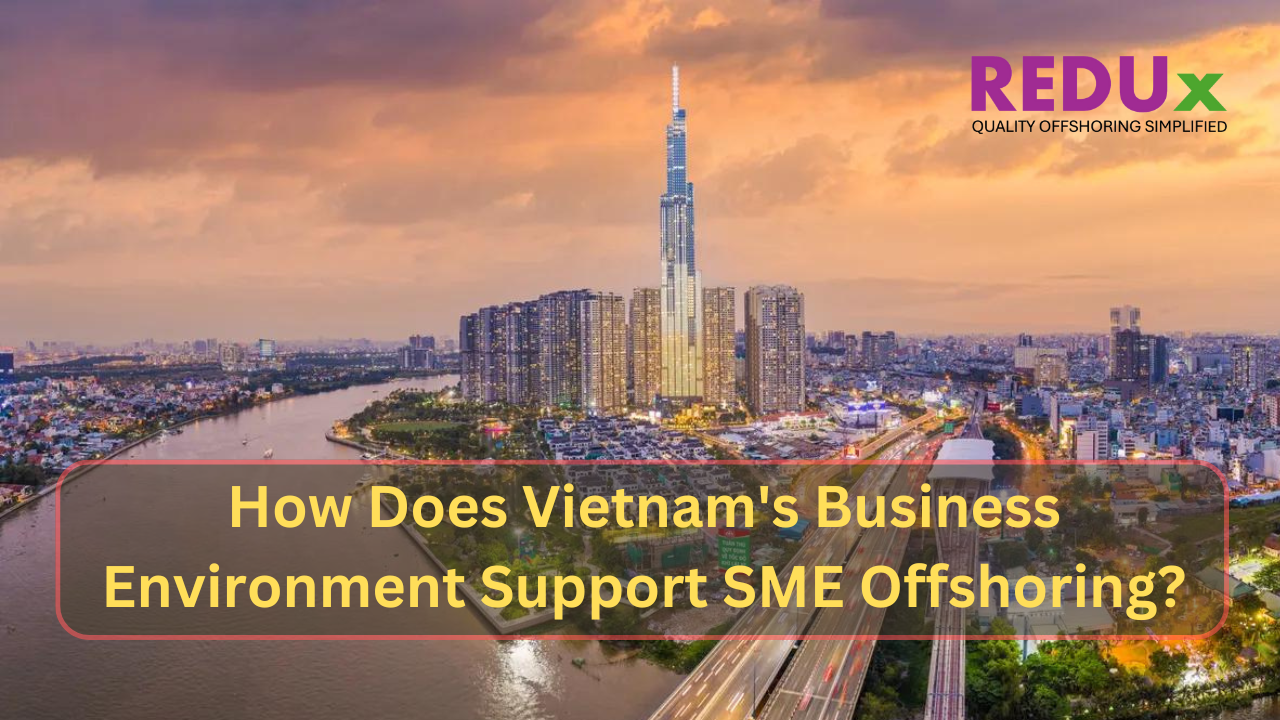How Does Vietnam’s Business Environment Support SME Offshoring?

Vietnam has rapidly emerged as a prime destination for small and medium-sized enterprises (SMEs) looking to offshore their manufacturing and business processes. This Southeast Asian nation offers a favorable business environment characterized by competitive costs, a skilled workforce, and strategic governmental policies. This blog post delves into how Vietnam’s business environment supports SME offshoring and provides actionable insights for businesses considering this move.
Key Factors Supporting SME Offshoring in Vietnam
- Cost-Effective Labor Force
One of the most compelling reasons for SMEs to offshore to Vietnam is the significant cost savings. Labor costs in Vietnam are substantially lower than in Western countries and even some Asian peers like China and India. This cost advantage extends beyond wages to include lower real estate prices, cheaper raw materials, and reduced transportation costs.
- Skilled Workforce
Vietnam boasts a young, educated population with a high literacy rate. The country has invested heavily in education, particularly in engineering and IT, producing a steady stream of skilled graduates. This educated workforce is adept in specialized areas such as manufacturing, IT, and engineering, making them ideal for various offshoring needs.
- Favorable Business Environment
The Vietnamese government has created a pro-business environment by offering various incentives to attract foreign investment. These include competitive corporate tax rates, streamlined business registration processes, and investment in industrial zones. The regulatory framework is also improving, making it easier for SMEs to set up and operate in Vietnam.
- Strategic Location
Vietnam’s strategic location in Southeast Asia offers logistical advantages. The country is well-connected to major markets such as the US, Europe, and other Asian regions through efficient shipping routes. This geographical advantage reduces international freight costs and enhances market access.
- Government Support and Infrastructure
Vietnam’s government is committed to improving the country’s infrastructure, investing heavily in transportation, telecommunications, and industrial zones. This ongoing development ensures reliable and high-speed communication networks, which are crucial for offshoring operations. Additionally, the government supports digital skills development, further enhancing the country’s attractiveness for SMEs.
Challenges and Mitigation Strategies
While Vietnam offers numerous advantages, SMEs must navigate certain challenges to ensure successful offshoring:
- Language and Cultural Barriers: Employ local quality control teams and third-party inspection services to bridge language and cultural gaps.
- Intellectual Property Concerns: Implement robust IP protection measures and conduct thorough due diligence on suppliers.
- Infrastructure Limitations: Focus on regions with well-developed infrastructure and leverage government incentives for high-tech zones.
REDUx’s Comprehensive Offshoring Solution
At REDUx, we understand the complexities of offshoring and offer a comprehensive solution tailored to SME needs. With 20-year pre-vetted Contract Manufacturing relationships across Asia, Eastern Europe, and Mexico, we match clients’ requirements based on variables like volume, price, certifications, and vertical specialties. Our expertise in design for manufacturability and materials science ensures that we take all the risks, unknowns, and effort out of the strategic offshoring process for SME tech and hardgoods manufacturers.Our trusted relationships, language and culture skills, project management resources, quality audit background, and engineering and logistics capabilities enable us to deliver an end-to-end solution with no upfront costs. We partner with you to manage the process, sharing only 20% of the net ongoing savings.
Summary of Lessons Learned
- Leverage Cost Advantages: Vietnam offers significant cost savings in labor, real estate, and raw materials, making it an attractive offshoring destination.
- Utilize Skilled Workforce: The country’s young, educated population is well-equipped to meet the demands of various industries, particularly manufacturing and IT.
- Navigate Regulatory and Infrastructure Landscape: Take advantage of government incentives and focus on regions with robust infrastructure to mitigate potential challenges.
Recommended Reading
- “Vietnam 2024 Outlook: The Investor’s Guide to Growth” by KPMG
- “The Benefits and Challenges of Outsourcing Production to Vietnam” by GBL Marketing
Finding and managing high-quality, high-savings offshore manufacturing for small to medium-sized North American businesses can be confusing and risky. At REDUx, we partner with you to manage the process end-to-end with no upfront cost, instead, sharing only 20% of the net ongoing savings. Contact us at www.REDUxEngineering.com today!
Subscribe to our Social Media Platforms for Ongoing Resources and Information:
- YouTube: https://www.youtube.com/@REDUxEngineering-Bottomline
- Instagram: https://www.instagram.com/reduxengineering/
- LinkedIn: https://www.linkedin.com/company/redux-engineering/about/?viewAsMember=true
- Facebook: https://www.facebook.com/profile.php?id=61559808581134
#VietnamBusiness #SMEOffshoring #OffshoreManufacturing #VietnamEconomy #SkilledWorkforce #BusinessEnvironment #CostSavings #GovernmentSupport #InfrastructureDevelopment #REDUxEngineering #GlobalSupplyChain #Manufacturing #BusinessProcessOutsourcing #StrategicLocation #ForeignInvestment #EconomicGrowth #TechIndustry #ManufacturingSolutions #SupplyChainManagement #SMEManufacturing
#QualityControl #VietnamManufacturing #Manufacturing2024 #OffshoreManufacturing #REDUxEngineering #QualityAssurance #ManufacturingTips #TechInManufacturing #AuditProcess #InspectionProcess